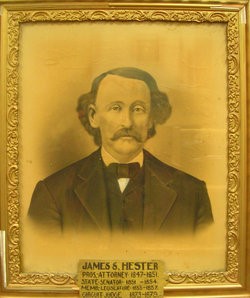Biographical Details
Date of Birth: 1824
Birth Location: Monroe County, IN, USA
Major Study: Law
Graduation Year(s): 1843, 1845
Degree(s) Earned: Bachelors, Bachelor of Laws
Date of Death: July 29, 1879
Death Location: Nashville, IN, USA

Date of Birth: 1824
Birth Location: Monroe County, IN, USA
Major Study: Law
Graduation Year(s): 1843, 1845
Degree(s) Earned: Bachelors, Bachelor of Laws
Date of Death: July 29, 1879
Death Location: Nashville, IN, USA
The first of his parents’ seven children to live beyond the age of three, James Scott Hester was educated at a public school in Bloomington, Indiana. He graduated from IU with his bachelor’s degree at age eighteen or nineteen and his law degree at age twenty or twenty-one. In 1845, he moved with his parents to California, along with his thirteen-year-old brother. He spent a few years in California before returning to Indiana.
In 1852, Hester wrote all the annotations accompanying the complete revision of the laws of the state of Indiana for its 1851 constitution, which holds (with amendments) today. The resulting two printed volumes remain the canonical source for Indiana’s legal history. In 1856, he edited the United Brethren Church newspaper,Hickory Withe. Enlisting at age forty-one, he served as a colonel in the Union Army. After the war, he was elected judge of the circuit court of Bartholomew and Brown Counties in Indiana.
Hester married and had a daughter, Jennie, and two sons. Both sons, born after the Civil War, died at age one and at age five and were buried in Brown County, Indiana. His younger brother, William, lived to age eighty-four, his younger sister to age ninety-six, and his daughter, Jennie, to age eighty-five. His family home (the Hester House) is still standing in Nashville, Indiana, and has been listed as an Indiana Landmark. A portrait of Hester still hangs in the Brown County Courthouse.
Hester’s father, Craven Hester, returned to Indiana for a short time to help his son run for clerk of Brown County on the Democratic ticket. Through a printing error on the ballots, the father, rather than the son, was placed on the ticket and elected to an office for which he had not been a candidate. Hester the elder was inducted into the office and held it until a special act of the state legislature could be passed to seat Hester the younger instead.